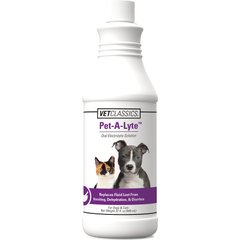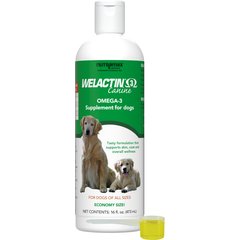Liver Fibrosis in Young Dogs
Juvenile Fibrosing Liver Disease in Dogs
Juvenile fibrosing liver disease is a noninflammatory liver disease which causes excessive extracellular matrix proteins to deposit in the liver tissue (also known as liver firbosis). It is typically seen in young or juvenile dogs, especially large breeds. If left untreated, a dog with this disease may develop cirrhosis and liver failure.
Although the cause to the fibrosis remains uncertain, chronic exposure to toxic bile, exposure to intestinal toxins, and liver injuries may be a factor.
Symptoms and Types
- Vomiting
- Diarrhea
- Blood in stool
- Loss of appetite (anorexia)
- Distended abdomen (ascites)
- Stunted growth, poor body condition
- Increased frequency and volume of urine (polyuria)
- Increased thirst (polydipsia) and consumption of water
- Stone formation in kidney, bladder, or urethra
- Nervous symptoms may be seen due to hepatic encephalopathy
Vet Recommended Health Support
- Purina Pro Plan Veterinary Diets FortiFlora Powder Probiotic Digestive Supplement for Dogs, 30 count$30.99Chewy Price
- VetClassics Pet-A-Lyte Oral Electrolyte Solution Dog & Cat Supplement, 32-oz bottle$18.53Chewy Price
- Nutramax Welactin Omega-3 Liquid Skin & Coat Supplement for Dogs, 16-fl oz$27.99Chewy Price
- Fera Pets USDA Organic Pumpkin Plus Fiber Support for Dogs & Cats, 90 servings$34.95Chewy Price
Causes
Juvenile fibrosing liver disease is often associated with chronic exposure to gastrointestinal toxins. However, it may also relate to hemorrhagic gastrointestinal illnesses (portal endotoxemia) in young dogs.
Diagnosis
You will need to give a thorough history of your dog’s health to your veterinarian, including the onset and nature of the symptoms. He or she will then perform a complete physical examination as well as a complete blood count, biochemistry profile, and urinalysis. In some dogs, liver enzyme levels are found to be abnormally high in biochemistry panels, while the urinalysis may reveal the presence of ammonium bicarbonate crystals in the urine.
Abdominal ultrasonography will help in determining the structure and size of liver, but a liver biopsy may be required for detailed analysis of the liver tissue. If right-sided heart disease is suspected, your veterinarian may recommend performing echocardiography. Your veterinarian may also take a sample of the dog's abdominal fluid for further analysis, or conduct routine coagulation tests to rule out blood coagulation disorders.
Treatment
Cases in which there is severe liver disease or hepatic encephalopathy, immediate hospitalization is required. Treatment, however, is typically focused on addressing the various complications related to juvenile fibrosing liver disease. For example, dogs with fluid buildup in the abdomen (ascites) will be prescribed medicines such as diuretics to enhance fluid loss. Similarly, dogs with urinary stones may require medication to resolve that issue. Antibiotics, meanwhile, are used to treat infections, and vitamins are added to the diet to improve overall health of the dog.
Living and Management
The prognosis for the dog will largely depend upon the level of fibrosis and liver damage. Although fibrosis may continue with advancing age, long-term success is possible if diagnosis and treatment occur in a timely fashion. Regular laboratory testing, including liver biopsies, will be required to monitor your dog's progress and status of the disease. If the fibrosis should recur, the dog may require further hospitalization.



